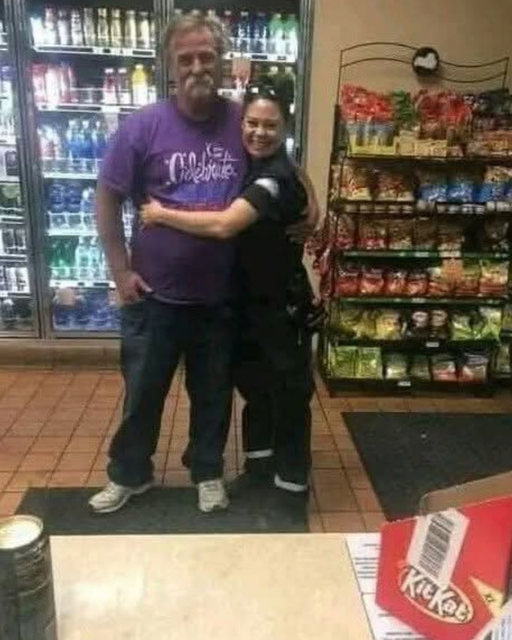I work the overnight shift at a gas station just off the highway. The kind of place that hums with flickering fluorescent lights, smells faintly like burnt coffee and motor oil, and never fully sleeps. Most nights are uneventful—a few long-haul truckers grabbing snacks, some sleepy college kids on energy drinks, and the occasional traveler who clearly missed their exit 30 miles ago.
You get used to the quiet. The repetition. The faces that blend into routines.
But there was this one guy.
Always in the same faded purple shirt.
Always came in around 12:15 a.m.
Always bought the same thing: a coffee—black, no lid—and, if he was hungry, a stick of peppered jerky.
He never said much.
Didn’t linger.
Nodded if I made eye contact. Left exact change on the counter.
A mystery man in a threadbare shirt and work-worn hands.
We started calling him “Purple Shirt” behind the counter. Not in a mean way—more like a marker in the timeline of our shift.
“Purple Shirt just came through.”
“Guess it’s half past midnight.”
It became part of the rhythm. A familiar note in the song of our nights.
Then last week, everything changed.
I walked into the backroom for a break and found Leina crying.
Leina’s my coworker—the youngest of us, barely 22, always kind, always tired but trying. She’s been raising her little brother ever since their mom passed. Works full-time here, part-time online classes, and still somehow finds time to pack his lunches and quiz him on spelling words.
Her eyes were red, and her phone was face-down beside her.
“What’s wrong?” I asked, even though I already had a pit in my stomach.
She wiped her nose with the sleeve of her hoodie. “My car,” she said. “Completely done. It won’t even start. Mechanic says the repairs would cost more than it’s worth.”
I knew what that meant.
No car meant no way to get her brother to school. No way to get to work. No way to keep up with… life.
We sat there in silence. Because what do you say when someone’s already giving life everything they have, and it’s still not enough?
Later that night, just after midnight, Purple Shirt came in.
Same shuffle to his step. Same quiet demeanor.
But this time, he didn’t go straight to the coffee.
He came to the counter and looked right at me.
“Leina here?” he asked, voice low.
I blinked. Nodded.
She came out from the back, still looking worn down, trying to pull it together.
And that’s when he did something I’ll never forget.
He reached into his jacket and pulled out a folded sheet of paper.
It was a printed page from GoFundMe—Leina’s campaign that her cousin had quietly started just that morning, hoping to raise a few hundred bucks to get her back on the road.
Then he looked at her and said, simply, “It was me.”
Leina stared at him, confused.
He smiled gently.
“I donated,” he said. “Anonymous. Enough to fix it. Maybe even trade it in, if you’re smart about it.”
Silence.
Leina just stood there, hands over her mouth.
I was behind the register, jaw halfway to the floor.
Then she moved—fast—wrapped her arms around him like she was hugging her own father.
He stood there awkwardly for a second, then patted her back, like he wasn’t used to being needed anymore.
I grabbed my phone and snapped a picture. Not because I wanted to post it online or chase some viral moment—but because this was something real. And I didn’t want it to disappear.
After she pulled away, he finally explained.
“I used to run a shop,” he said. “Down on Elm. Before it burned down.”
We both nodded. We’d heard about that fire. Years ago. A string of small businesses never rebuilt.
“Never really got back on my feet,” he added. “Did odd jobs. Lived small.”
Then he looked at Leina.
“But I remember what it felt like. Sitting behind a steering wheel, praying it’ll turn over. Knowing you don’t have a backup plan.”
That hit me in the chest.
Because so many of us walk through life like we’ve got time and choices and margins for error.
But some people?
Some people walk a tightrope every day.
And sometimes the smallest gust—like a car breaking down—is enough to shake everything.
Since then, everything’s been different.
Leina’s back on the road. She found a reliable used car from a neighbor down the street, and she swears it even smells like her mom’s old car.
Purple Shirt still comes in, still around 12:15.
But now we know his name—Mick.
And now, we don’t call him Purple Shirt anymore.
Now, we call him “Mr. Midnight Miracle.”
He doesn’t like the nickname. Shrugs it off with a smile.
But I think he secretly appreciates it.
Sometimes we think the people around us are just passing by.
Just quiet customers. Just nods and small smiles.
But you never know who’s carrying a story.
A scar.
A memory of what it means to be desperate—and the heart to make sure someone else never feels that way again.
If this story moved you, share it.
For the quiet givers.
The ones who don’t wait to be asked.
And the miracles that show up at midnight—wearing a faded shirt and carrying hope in exact change. 💜⛽️🛠️




